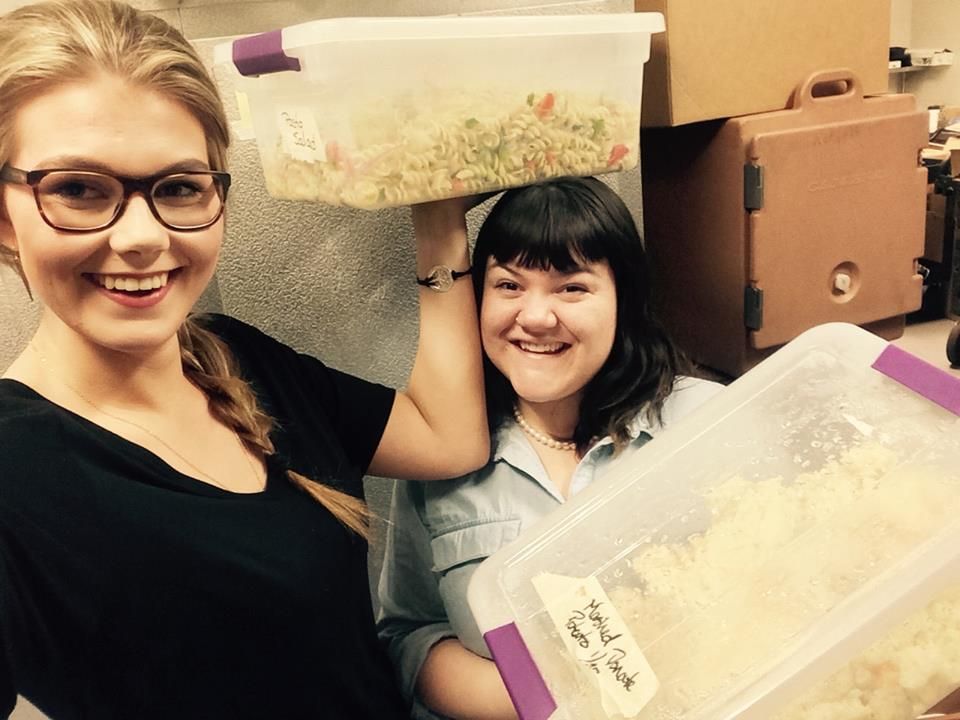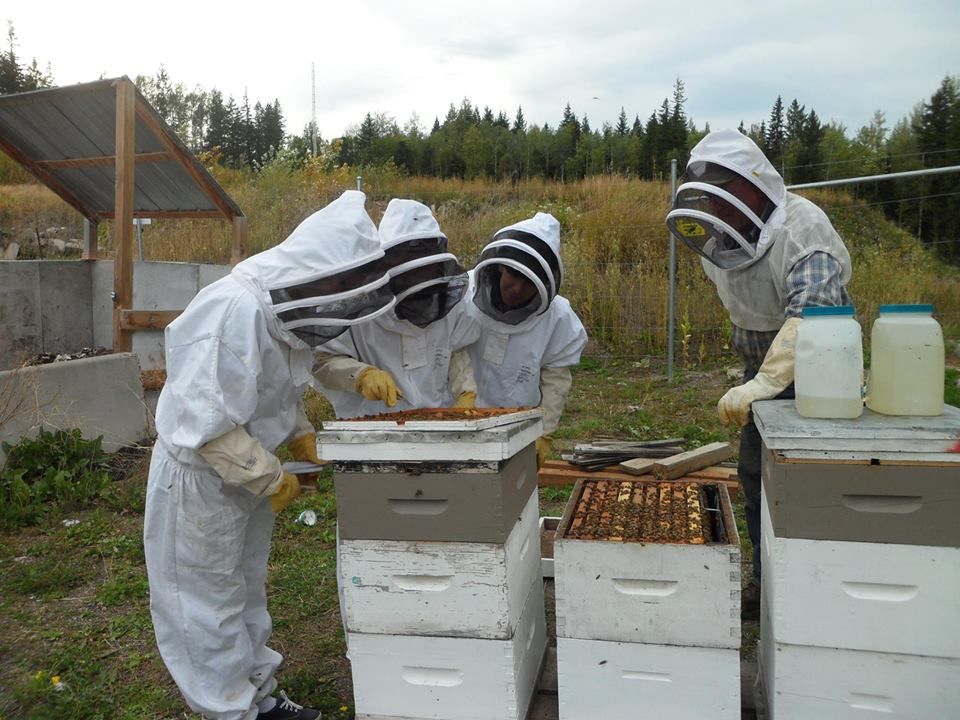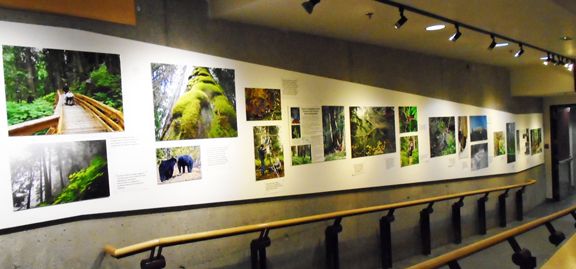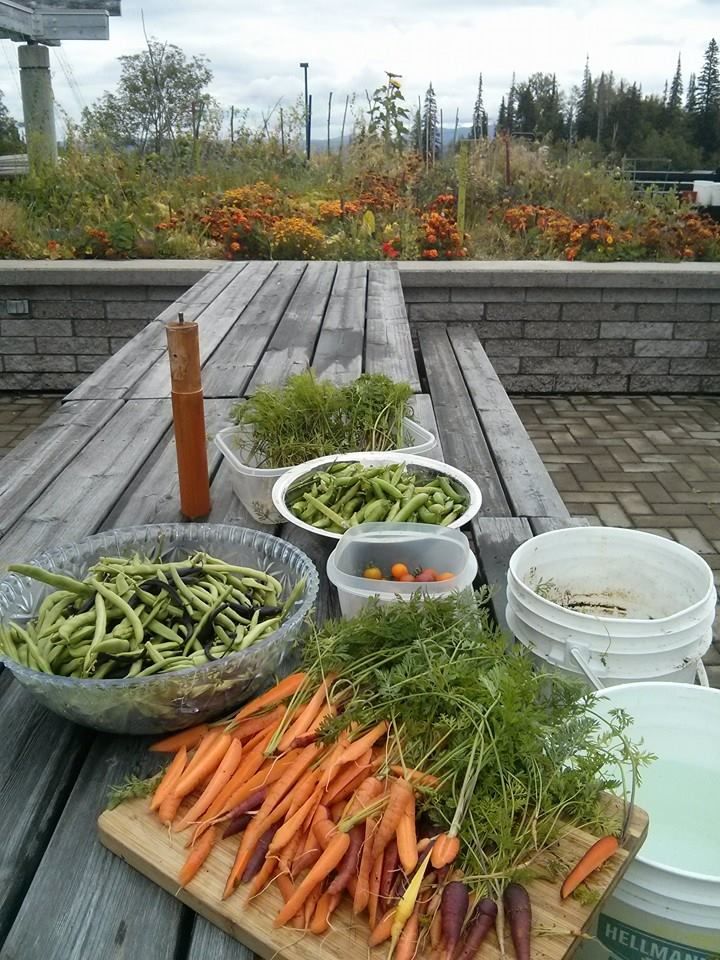Interested in learning more about the projects funded by the Green Fund? Below is a list of successfully-funded projects, along with a short description and links to final reports when available.
(2016 - 2023 Projects to be updated)
2024 Projects
September
Adopting Vermicompost Worms as Pets (Dr. Resty Nabaterega), Dr. Oliver Iorhemen)
Hydroponics at UNBC (Madi Tokarchuk - G-Force)
Library Book Cutter (Heather Empey - UNBC Library)
January
Student-Focused Gardening Project (Students for a Green University)
Students for a Green University is applying for repairs and updates in an existing SGU dome greenhouse on the north end of campus and to establish short, affordable horticulture workshops on seed starting, growing in small spaces, and other complementary garden skills.
Final Report: sgu_2024_greengrant_finalreport.pdf
Reusable Period Product Project (Mya Knudsgaard/Northern Women’s Centre)
Purchase reusable menstruation products and distribute free on a first come first-served basis.
Read their interim report here: Reusable Period Product Project - interim report 2024
2015 Projects
January
Borrow a Mug (BAM) Expansion Project
The Borrow a Mug (BAM) program was started as a student action group project funded by PGPIRG in January 2012 by a group of Environmental Studies students. The objective of the project is to encourage the UNBC community to cut down on use of disposable cups by providing them with a reusable alternative. Clean mugs are stationed at Tim Hortons in the Wintergarden and at Degrees Coffee Co. in the NUSC building. While BAM has become a successful Green program on campus, there are important barriers that limit its ability to expand its waste diversion efforts. Notably, the principle challenges facing BAM are capacity and uptake.
In order to expand the capacity and adoption of BAM, we propose to:
- purchase a uniform set of BAM mugs
- build or purchase boards to hang clean mugs on the wall, making them more visible and accessible.
- develop a partnership with Chartwells to have them assist with or take over washing the mugs
- develop a promotional campaign for BAM, including printing new signs, and advertising it through different media
- provide a small stipend for the volunteer coordinator
Disposable cups make up an important component of garbage waste on campus and elsewhere that is easily preventable. Success of the BAM program is easily seen through the number of mugs used and washed every day.
Investigating Food Security and Insecurity Within the UNBC Community
As part of an on-going and expanding Food Security and Sustainability Policy discussion in 2014, one element coming under discussion is the issue of food security within the UNBC community. At present there is little existing data on food security although anecdotal evidence suggests that this aspect requires further investigation as part of the process of developing a Food Security and Sustainability Strategy. Developing a strategy around food security within the UNBC community requires developing data to inform us upon the following key questions:
- Within the different sub-populations of the UNBC community (faculty, staff, graduate students and undergraduate students), what levels of food insecurity (as per the project’s operating definition) exist, and over what length of time for an individual?
- What is the reason for the level of food security; i.e. it is lack of funds, lack of time, lack of knowledge, lack of access or another reason?
- What solutions to food insecurity do individuals within the four sub-populations have to suggest?
Outcomes would include a report on the responses to these key questions coupled with recommendations that can be incorporated within a larger Food Strategy Plan for UNBC.
UNBC/Community Hosting of Naomi Klein (Author; Columnist; Activist)
Naomi Klein is an established Canadian author on socio-environmental issues, who has written about consumption (NO LOGO- 1999), and ‘natural disasters’ (THE SCHOCK DOCTRINE-2007). Her most recent book, THIS CHANGES EVERYTHING: CAPITALISM VS. THE ENVIRONMENT (2014), is well researched, and combines IPCC type data with international case studies and examples of (unsustainable) paths charted, and potential ‘ways forward’. She is an ideal UNBC guest. She is both scholarly and academic, and her work pays dual attention to the physical environment and to the humans who shape it. Her writing is weighty, but accessible. She also co-founded 350.org, a grassroots organization for climate change solutions, and has drawn particular attention to Aboriginal Canada’s climate change plights.
Hosting her would allow for greater discussions of topics often in UNBC classes, papers, and hallways—expanded climate change-related interactions with the greater regional community, and opportunities to expose Ms. Klein to climate-change realities and concerns in northern BC. By hosting her, we will embody our GREEN institutional goals to consider intersections between community, environment, and development, and to offer northern perspectives. This funding will help to ensure that these events will be free and accessible. Conversely, we will reserve special meals/meetings for groups with distinct climate change-related interests—Aboriginal leaders, students, and climate change researchers will be invited to engage with Ms. Klein in small groups. This will enrich us, and bring local Prince George and UNBC perceptions, thoughts, and activities into Klein’s knowledge of climate change, and community and scholarly responses to it.
2014 Projects
September
Completing Key Organic Waste Audits for UNBC Prince George Campus
UNBC is poised to close the loop on its organic waste generation. While current organic waste handling at UNBC is operated by student-funded/PGPIRG initiatives, it is both underfunded and inadequate to handle all organic waste on campus. An in-vessel digesting system would decompose all organic waste (an increase from current compostable quantities) throughout all seasons. Organic waste generation data is required to properly scale a system that meets the campus supply. Some of the authors of this proposal, with funding from the UNBC Research Office, completed an audit of organic waste generation for the residence buildings nearly 2 years ago. This, in conjunction with previous organic waste production data from PG- PIRG and Smyth et al., allowed us to estimate total organic waste generation for the Prince George UNBC campus. However, with a new cafeteria system on campus, considerable uncertainty now exists about its organic waste generation. Other important organic waste sources (i.e. Thirsty Moose and Degrees) also need to be quantified. Our proposal will ultimately cumulate all existing data for organic wastes and 'browns' on campus to estimate total UNBC PG campus organic waste generation.
We propose to do one or more spring audits of the new UNBC cafeteria, Thirsty Moose Pub and Degrees Coffee Co. outlets. Ideally we would like to do multiple spring waste audits, but this may depend on how quickly the new cafeteria can settle into a steady-state and how efficiently and effectively waste audit personnel and protocols produce audit information.
May
UNBC Campus Food Strategy Group Coordinators

The long term goal of CFSG Coordinators is to support local, sustainable, healthy and accessible food options at UNBC. As student coordinators our role has been to help formulate a Campus Food Strategy Group made up of various stakeholders who are involved in the food system and related projects. From this group we are then able to support existing and upcoming food projects on campus, and aid the University in its transition towards local and sustainable food procurement.
CFSG coordinators have been involved in various projects over the years including, the facilitation of a new food contract with Chartwells, construction of a Dome Greenhouse, and Local Foods Week. This year CFSG has two new coordinators with fresh ideas and new perspectives. The coordinators require funding to cover wages as well as operations costs. We are seeking $5,000 from the Green Fund, which will allow us to continue providing support and stability to other food initiatives on campus as well as start new projects such as;
- Finding a new line of communication surrounding current food initiatives on campus.
- Chairing the University Farmers’ Market Committee.
- Creating a Community Kitchen on campus.
- Securing funding for the Community Kitchen.
- Using this years student orientation as an opportunity to educate new students on the correlation between food and their health and wellness.
- Finding students to complete an audit of the University’s current local food procurement and waste production.
- Increasing student engagement at UNBC’s Local Foods Week and Green Day.
- Expanding the University's compost program.
- Securing permanent funding for the CFSG coordination.
Lower Water Consumption in the Irrigation System
To reduce water consumption of the irrigation systems at UNBC. Through adding visible weather stations to the controllers, the system will become “smart”. The weather stations help the system react faster to changes in the weather and water only when needed. Weather stations would be placed in very visible locations on campus.
UNBC Food Waste Minimisation and Redistribution Project
The relationship between issues of social justice and environmental sustainability is increasingly important to members of the UNBC community. We recognise that environmental sustainability does not exist in a void but instead is supported by, and contributes to, socially just communities and systems. UNBC students are finding innovative ways of marrying their social values to their environmental principles. In September 2014 the new “all-you-care-to-eat” cafeteria will launch. We are concerned that this new service style will lead to an increase in food waste. As such, we are taking a pro-active approach to this concern and are putting in place methods of minimising waste and re-distributing it. We have met with our food service provider, Chartwells, who are very interested in supporting this project and developing it with us.
Last semester two students developed a class project on food, hunger and homelessness. Their goal was to salvage wasted food from UNBC and take it to the Salvation Army food bank. After a series of meetings with Chartwells and other campus stakeholders, a pilot project has been developed to minimise food waste and re-distribute it to food banks on and off-campus. The project aims to facilitate a group of students to work with cafeteria staff to collect unused/ salvageable foods from the cafeteria and conference services. These food-safe trained students will then package these foods and deliver them to food banks on campus or prepare them to be picked up by off-campus food banks.
January
2014 Land Stewardship Initiatives for UNBC’s Forests, Green Spaces, and Ecosystems
UNBC owns or directly manages 548 hectares (5.5km ) including and directly adjacent campus. Over 90% of these lands are forest ecosystems that are highly valued to the university and broader community, both for the educational and scientific research opportunities they provide, and the year round recreational and nature-interpretation amenities that they afford. The project, addresses goals set in UNBC’s higher level plans including the 2009 Green Strategy and the 2012 University Master Plan and will encourage and facilitate the active stewardship of UNBC’s forests.
Key products of this project.
- Production of hardcopy maps and digital map / data products for UNBC forest lands, customized and accessible for teaching, research, recreation, and nature interpretation.
- Reforestation of, and restoration treatments for riparian forest along a previously disturbed reach of lower Shane Creek directly adjacent to the UNBC campus.
Benefits to UNBC, Sustainability, Ecosystem Health, and Forest Amenities.
- Improving overall knowledge and awareness of UNBC forest lands, ecosystems, and stewardship issues by UNBC students, faculty, staff, and the local Prince George community.
- Providing better and more accessible tools for teaching, research, recreation, and forest stewardship on UNBC forest lands, in forms that are easily accessed by, and meet the needs of diverse UNBC users.
- Undertaking well-targeted ecological restoration and related ‘green space’ projects on UNBC forest lands including opportunities for community and volunteer engagement.
UNBeeC Beekeeping

The UNBC Biology Club is requesting funding from the Green Fund to establish a self-sustainable, on-campus beekeeping project. This projects aims to raise awareness of the importance of honeybees as pollinators in the production of food. Over the course of twelve months, ten additional hives and necessary honey extraction equipment will be purchased. Students, faculty and community members will have the opportunity to volunteer and learn the processes of hive maintenance as well as honey extraction. During winters, beekeeping workshops and tutorials will provide more opportunities to engage the UNBC community. The Biology club will be working together with local beekeeper Gerry Bomford, and PGPIRG. Gerry Bomford will assist with set up of the hives and mentoring volunteers on beekeeping practices. PGPIRG has had previous experience with the promotion and selling of local, sustainable foods and will be an asset to this project. These beehives will add value to UNBC by providing a new, sustainable food source and emphasizing the critical role of pollinators through learning opportunities for UNBC and the larger Prince George community.
The Ancient Forest Trail - Enhancing UNBC as a Green University Destination

An important component of UNBC’s “green” image is our unparalleled access to natural environments in northern British Columbia and the hands-on involvement this provides students and faculty to participate in the learning environment at UNBC. A small number of these landscapes have assumed disproportionate importance as symbols of a ‘green” University and the potential that this represents for our institution. These sites have become important quality of life indicators for UNBC. They attract both students and faculty alike when they consider UNBC as a career choice. Perhaps the most emblematic of these sites is the Ancient Forest Trail east of Prince George. Images of one-thousand year old giant cedars have adorned UNBC publications and web pages, and have become common in advertising for the tourism sector and other industries in northern British Columbia. The current proposal by scientists for nomination of this site as a World Heritage site provides a major opportunity for involvement of UNBC students and faculty in the nomination process and in subsequent research and teaching at this site. The proposed green fund project would mount a display in the Rotunda Gallery to raise awareness of students and faculty about this site, highlighting long-term opportunities for teaching and research. The web legacy of this project would extend the reach of our branding as a green university to a national and international audience. This will be done in partnership with PGPIRG, who have mounted a concurrent Facebook initiative to raise student awareness.
PGPIRG Roof Top Garden Project

The Roof Top Garden Project will provide a wonderful learning opportunity for a student who is interested in developing their skills in gardening, growing food and maintaining the campus Compost Program during the summer months . Educational programming will be provided that will benefit the UNBC campus community.
Roof Top Garden: Our goal for this year’s growing season is to create a Roof Top Garden (situated above the cafeteria) for the whole campus community. Staff, faculty, students and children could plant, water, tend and harvest in the garden as an onsite learning opportunity with support from the summer student.
Learn To Grow Workshops: We plan to hold Learn To Grow workshops at the Roof Top Garden during the lunch hour June-August. These will consist of several 20 minute workshops on a series of topics: e.g. garden maintenance and care, water conservation, mulching, growing herbs, companion planting, pest control, and other topics. We want to make the Roof Top Garden a comfortable outdoor space for everyone on campus to enjoy. There are picnic tables near the Roof Top Garden which are hardly used. It could become a great spot outdoors on campus to eat lunch, listen to a short session on gardening and otherwise “chill”.
Compost Program: The student will collect organic waste (green bins, Tim Horton’s, the cafeteria) and will weigh, record and transfer the waste into an indoor hopper. 6-8 work parties will be organized at the Compost site to shovel, sift and bag compost for purchase by the public as well as for landscaping purposes at UNBC.
Solar PV Data Collection and Education Projects
This green fund application is for instruments to support educational activities around solar energy at UNBC and in Prince George. The funds requested are for supplies to build do-it-yourself pyranometers (measure incoming sunlight) and for a professional grade pyranometer to measure both diffuse and direct solar energy. The do-it-yourself kits will be assembled by summer internship students. The professional grade instrument will become part of the UNBC weather station, with data accessible to everyone. The low cost pyranometers and the data collected from the professional grade pyranometer will be used for student projects (courses and independent studies) to study solar energy at UNBC and in the community. An information event on solar energy and possible projects will be held in September 2014, and students will present project results at the end fall term.
2013 Projects
September
UNBC Campus Food Strategy Group (CFSG) Coordination
Since 2011, the UNBC Campus Food Strategy Group (CFSG) has been actively working to improve the coordination and sustainability of UNBC’s campus food system. The CFSG has worked with campus, community, provincial, and national stakeholders for the purposes of creating a more effective, efficient, enjoyable, and sustainable campus food system.
Between September, 2011 and August, 2013 CFSG Coordinators have received an honorarium and expense coverage from the National Campus Food Systems Project headed by Sierra Youth Coalition and Meal Exchange. This honorarium has allowed CFSG coordinators to help improve UNBC’s campus food system by working with stakeholders to help develop an effective campus food service provider RFP, promote UNBC BC Foods Weeks, Bring together the GUPC food subcommittee, engage in applied learning and research projects, and help develop the National Student Food Charter. With the end of the National Campus Food Systems Project funding the UNBC CFSG coordinators are collaborating with Vancouver Island University (VIU) CFSG Coordinators to begin the UNBC/VIU Campus Food Systems Project, which will aim to improve the health and sustainability of both campuses and communities through food initiatives. The intention of the project is to have multiple funding partners including the Vancouver Foundation, Moss Rock Park Foundation, Meal Exchange, and the VIU Sustainability Advisory Committee. The UNBC/VIU Campus Food Systems Project has secured some funding already and requires matching funding to receive the major source of funding from the Vancouver Foundation. As a part of the larger UNBC/VIU Campus Food Systems Project the UNBC CFSG is seeking $5,000 from the Green University Fund. This will be used to continue the work of the UNBC CFSG coordinators during the 2013/14 scholastic year. This will allow UNBC CFSG coordinators to continue their present work, which includes participating in the hiring process of UNBC’s new food service provider, finalizing UNBC’s adoption of the National Student Food Charter, and settling a long-term permanent funding structure for the CFSG.